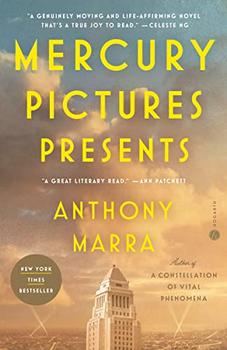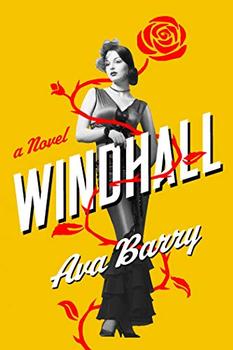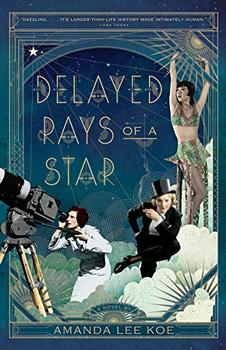Summary | Excerpt | Reading Guide | Discuss | Reviews | Beyond the book | Read-Alikes | Genres & Themes | Author Bio

A Novel
by Anthony MarraAnthony Marra's novel Mercury Pictures Presents opens in the office of Artie Feldman, the co-founder and part owner of the eponymous Hollywood studio. It's the summer of 1941, and Feldman is discussing two looming crises with his second-in-command, Maria Lagana, a 28-year-old Italian émigré. The first problem involves getting their latest picture past the Motion Picture Production Code Administration (see Beyond the Book) — the "puritans and spoilsports who upheld the moral standards of the movies" — helmed by Joseph Breen, "a bluenose so distraughtfully Catholic he'd once bowdlerized a Jesus biopic for sticking too close to the source material; apparently, a foreign-born Jew advocating for redistribution smacked of Bolshevism." The second predicament is that Artie has been "invited" to testify before the United States Senate's America First committee about allegations the movie industry is encouraging the country's entry into World War II — something Artie believes will be a "show trial."
The plot continues to follow Maria and Artie until about a quarter of the way through the novel, at which point it abruptly shifts to the tale of Giuseppe Lagana, Maria's father. Once a defense attorney, Giuseppe has been sentenced indefinitely to the "confino" of San Lorenzo, an Italian village set aside as a prison without walls for political detainees. Although at first glance this lengthy section feels more like an unrelated short story, its relevance becomes clear toward the end of the book.
Another hundred pages or so later the novel returns to California, but things are radically different there from how they were when we left. The Japanese have bombed Pearl Harbor, and the US has declared war; Artie has gone from "pariah to prophet" overnight, and Mercury Pictures is hired to make propaganda films for the war department. It's at this point that the reader encounters the real meat of the story, and what has been a lighthearted jaunt becomes something darker as it explores how the war impacted the many immigrants who worked in Hollywood at the time. The narrative becomes more diffuse — less focused on the two principals and more on the lives of other Mercury workers, like Chinese American Eddie Lu, a Shakespearean actor pigeon-holed into portraying villainous Japanese commanders, and Vincent Cortese, an itinerant photographer prohibited from being either itinerant or a photographer by the government's restrictions on those it considers "enemy aliens." The author explores in depth the prejudice and suspicion Italian, German and Japanese immigrants endured during the era, as well as the pain of actively supporting the war effort to the detriment of their birth countries.
Marra's prose is lush and evocative, eliciting a whole host of emotions from his readers; it's by turns laugh-out-loud funny, joyous, poignant and heartbreaking — but always gloriously descriptive ("The pianist lung[ed] through Schoenberg with the violent elegance of a cat stalking a butterfly across the keyboard"). I particularly enjoyed the author's frequent digressions that have little to do with the plot but ramp up the novel's entertainment value while rounding out the characters. For example, as Artie contemplates his children:
"A few years back, before Mussolini joined himself to Hitler's hip like a colostomy bag, Artie had read Il Duce's autobiography for parenting tips. It was written in semiliterate bombast, its pages damp with autocratic spittle, the reading experience akin to literary lobotomy, and yet, Mussolini's leadership style made for inspired parenting ideas."
When a young Maria asks her old-world Italian mother to make her some Jell-O, the older woman thinks, "How could the blood of her blood define as food an invertebrate blob of unholy brightness made of horse hooves and…science! American cuisine was not fit for a civilized person."
Although the characters are by-and-large fictional, the author sticks closely to the historical record, and I reveled in the details. In one instance, he notes that Maria's aunts lived in a bungalow built from a kit ordered from the Sears Roebuck catalog. In another, he mentions that the famous Hollywood sign was originally called the Hollywoodland sign, erected to advertise a housing development by the same name. These bits of trivia as well as many others had me accessing Wikipedia late into the night for more information.
The cast here is extensive, and although the author is remarkably skilled at making each character unique and memorable, from time to time I did lose track of who was who. In addition, the novel isn't a particularly fast read with all its detours and backstories, and some may find the slower pace a challenge. It may also disappoint those looking for a repeat of Marra's remarkable debut novel, A Constellation of Vital Phenomena; while Mercury Pictures Presents is a fantastic book, it undoubtedly lacks the earlier work's deep emotional impact.
Regardless, I absolutely loved Mercury Pictures Presents, and it's at the top of my list of favorite books of 2022 so far. I would highly recommend it for readers who enjoy truly excellent literary fiction, as well as those interested in books about the film industry and how it was impacted by WWII.
![]() This review was originally published in The BookBrowse Review in August 2022, and has been updated for the
July 2023 edition.
Click here to go to this issue.
This review was originally published in The BookBrowse Review in August 2022, and has been updated for the
July 2023 edition.
Click here to go to this issue.

If you liked Mercury Pictures Presents, try these:

by Ava Barry
Published 2022
A stunning literary thriller in which an investigative journalist in modern Los Angeles attempts to solve the Golden Age murder of a Hollywood starlet.

by Amanda Lee Koe
Published 2020
A dazzling debut novel following the lives of three groundbreaking women - Marlene Dietrich, Anna May Wong, and Leni Riefenstahl - cinema legends who lit up the twentieth century.
Your guide toexceptional books
BookBrowse seeks out and recommends the best in contemporary fiction and nonfiction—books that not only engage and entertain but also deepen our understanding of ourselves and the world around us.